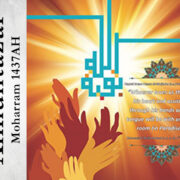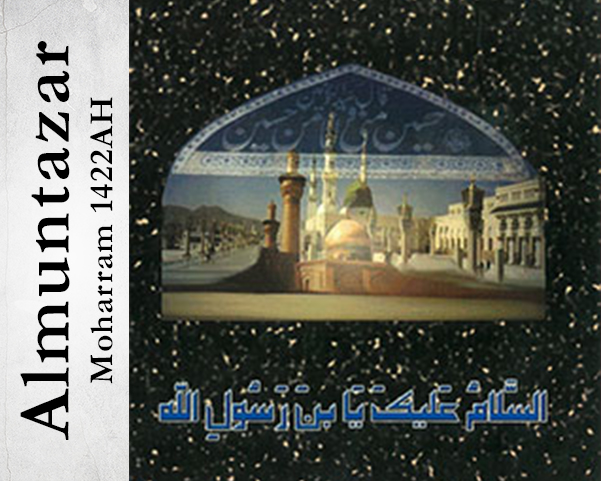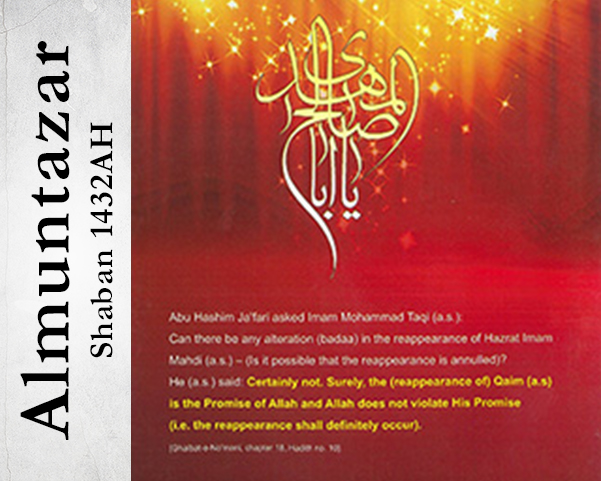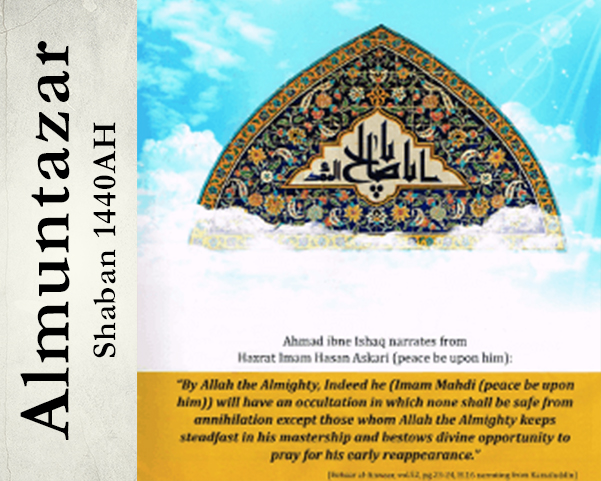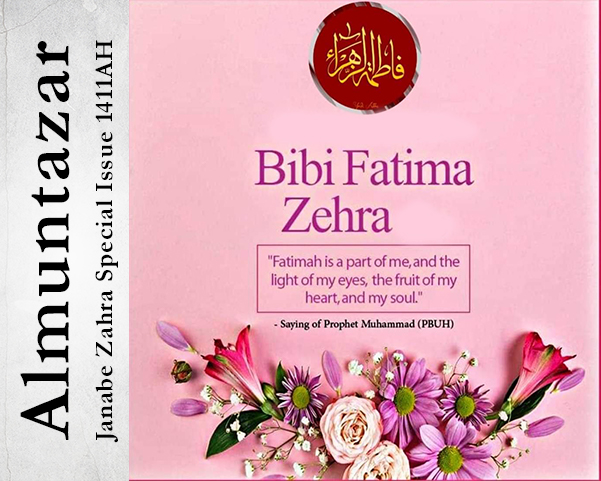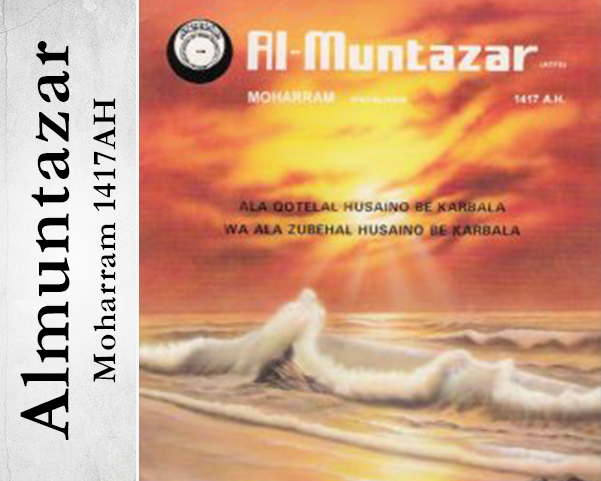(Continued from the previous Shabaan issue of 1431 A.H.)
“Peace be upon you O my Master. I’m your Slave. I acknowledge all of you [Ahle Bait (a.s.)], from your first one till the last one.”
The above sentence of the ziarat can be discussed on the basis of 4 words – Master (Maula), Acknowledge (Aarif), First (Ula) and Last (Ukhra). However, since the word Maula has already been discussed in some of the previous issues of Al Muntazar (especially in the special issue on 1400 years of Ghadeer) it would suffice to mention here that Maula is one of those words in Arabic which has contradictory meanings. It could mean a Master as well as a Slave. Both these meanings have been referred to in the above sentence. In the first instance it means Master whereas in the second part (Ana Maulaka) means that I’m your slave. The other word Aarif, is the Nominal Subject of ma’refat and irfaan and since the word ma’refat has also been discussed extensively, we shall not delve into its details. This brings us to the two words First (Ula) and Last (Ukhra). Both these words are on the scale of fo’la and as per Arabic grammar, they are the feminine for the superlative degree. Ula means beginning, first and next and it is the feminine for Awwal. In the Holy Quran when this word has been used in connection with the Hereafter, then it implies this world (duniya) since it is before the Hereafter. For instance, “And the hereafter is better for you (s.a.w.a.) than the first.” Similarly, ukhra means the other, earlier, the end and it is the feminine for aakhir. It has been mentioned more than 20 times in the Holy Quran.
It could also be possible that ula implies the time before the reappearance of Imam-e-Zamana (a.t.f.s.) whereas ukhra refers to the time after the reappearance and during his worldly rule. This can be emphasized through this tradition from Usool-e-Kaafi where Imam Jafar Sadiq (a.s.) explains the 20th verse of Surah Shura, “…and in the hereafter he has no portion” in the following manner,
“He shall not have any share during the truthful rule of the Qaim (of Ale Muhammad).”
[Al Kaafi, vol. 1, page 435]Similarly, it can also be related to Raj’at (The Returning) and Qiyamat. The conclusion here is that the one who recites this ziarat – while addressing his Master, Hazrat Baqiyatullah (a.t.f.s.) – confesses his slavery and servitude and simultaneously also claims that ‘O my Master, I recognize you as you should be recognized. I’m aware of all your means and methods and Allah knows the best.’
“I seek proximity with Allah, the Most High, through your intercession and the intercession of your progeny.”
In the above sentence of the ziarat, Ahle Bait (a.s.) have been described as the source of gaining proximity to Allah, the Most High. It means that if a person wishes to reach Allah, he should approach Him through these pure souls whom Allah Himself has attributed to be the means of achieving His nearness. There are certain groups of Muslims today, who deny the concepts of mediation (tawassul), intercession (shafa’at), visiting the graves (ziarat), etc. and their propagation is gaining such immense strength that some of our Shias too are being influenced by this ideology. Hence, we feel it is our responsibility to emphasize on this subject in order to strengthen the beliefs of the believers and give a strong reply to the hypocrites, Inshallah. Let us first discuss briefly on the word ‘I seek proximity’ (ataqarrabo). The general meaning of the scale or pattern to which the word ataqarrabo belongs is the acceptance of the effect of the verb. The word ataqarrabo means that I seek proximity to Allah through a medium. A mutaqarrib is a person who is in pursuit of nearness. This sentence from the ziarat talks about seeking nearness to Allah, but through the medium of Aale Muhammad (a.s.). Now let us discuss certain important things related to mediation (wasilah) albeit in a concise manner since this matter (concerning wasilah) requires an entire book.
First Part: Wasilah is a Divine Tradition (Sunnat of Allah)
Every Muslim, without a doubt, agrees to the fact that Allah, the Almighty, is Needless and Self-sufficient. In other words, Allah, the Most High, is a King Who has power over all things and does not need anyone. There is no partner for Him and everything is His creation. If anyone believes other than this, then that person has stepped out of the boundaries of Islam, and there are no exceptions to it. In spite of such magnanimous attributes, Allah, the Most High, has chosen means to execute His commands. No one in the world has the power to intentionally prevent it. But the All-Powerful, the One who is aware of all things, wished that He would execute all His commands through a medium. Hence, in order to execute His orders He created the Proximate Angels, Prophets, Messengers and their Noble Successors (peace be on them all). This is an undeniable reality. For instance, can anyone deny the sending of Prophets and Messengers for the guidance of mankind? Can anyone deny the sending of revelation (wahy) through Janabe Jibraeel (a.s.)? Can anyone deny that the responsibility of capturing the souls has been entrusted with Janabe Izraeel (a.s.)? Can the appointment of Janabe Israfeel (a.s.) as the ‘blower of the trumpet’ be denied? Can He not execute all of these by Himself? Definitely He can but He has chosen tawassul as His Sunnah. Perhaps, it is to prove to those so called Muslims who think that they can reach Allah directly. Allah Himself has commanded regarding tawassul,
“O you who believe! Be careful of (your duty to) Allah and seek means of nearness to Him and strive hard in His way that you may be successful.”
[Surah Maedah (5): 35]Second: Tawassul – In the light of the Holy Quran
Apart from the aforementioned verse of the Holy Quran, there are numerous other verses in which the concept of tawassul has been explicitly discussed. For instance, when the sons of Prophet Yaqub (a.s.) came to him and requested him to seek pardon for them – thereby implying that they intended to make Prophet Yaqub (a.s.) as their wasilah – he did not deny it but agreed to it. It is mentioned in the Holy Quran that,
“They said: O our father! Ask forgiveness for our faults, surely we were sinners. He said: I will ask for you forgiveness from my Lord; surely He is the Forgiving, the Merciful.”
[Surah Yusuf (12): 97-98]It is evident from this that Prophet Yaqub (a.s.) did not say that wasilah is bid’at (innovation), haraam (forbidden) and they should pray without any mediation. On the contrary, he (a.s.) accepted their mediation and breathed into them the hope of Allah’s Mercy and Forgiveness. There are many other such verses in the Holy Quran but we shall suffice with this keeping brevity in mind.
Third Part: Tawassul in the reliable traditions of Ahle Sunnat
Tradition 1
Usman ibne Hunaif narrates that once a blind person came to the Holy Prophet (s.a.w.a.) and said, “You pray to Allah that He cures me.” He (s.a.w.a.) said, “If you want I’ll pray for you and if you want you can be patient and patience is better for you.” The blind person said, “You please pray.” Holy Prophet (s.a.w.a.) ordered him,
“You perform ablution (wuzu) and perform it with complete concentration, pray two rak’at namaz and recite this dua, “O Lord! I beseech you that I turn towards you, Your Prophet who is a Merciful Prophet that, O Muhammad I turn towards my Lord through you that you fulfill my wish. O Allah! You accept the intercession of the Prophet (s.a.w.a.) in my favour.”
There cannot be any doubt over the reliability of this tradition because even the leader of the Wahhaabi sect, Ibne Taymiyyah, has confirmed its reliability. The famous Wahhaabi author ‘Rafaa’ee’, whose only aim was to refute the traditions concerning tawassul writes, “There is no doubt that this tradition is correct and famous and its reality is indisputably proven.”
[At-Tawassulo-ila-haqeeqati-tawassul, p. 158]This tradition has been narrated in Sunan-e-Nisaai, Sunan-e-Baihaqi, Mo’jam of Tabarani, Sunan-e-Tirmidhi and by Haakim Nishapoori in Mustadrak-us-Sahihain. [At-Tawassul]
Apart from this Zaini Dahlaan writes in his book ‘Khulasatul Aklaam’, Bukhari in his Taarikh, Ibne Majah in his Sunan, Hakim Nishapoori in Mustadrak-us-Sahihain and Jalaluddin as-Suyuti in Jame’ have narrated this tradition.”
Ibne Maajah has confirmed this tradition to be reliable. Haakim Nishapoori writes, “This tradition conforms to the conditions of Shaikhain (Bukhari and Muslim) but both of them have not narrated it.”
Tradition 2
Holy Prophet (s.a.w.a.) said,
“When Hazrat Adam (a.s.) committed Tark-e-Ula, he raised his head towards the sky and said: O Lord! I beseech You through Muhammad and his progeny that You forgive me. Allah asked him: Who is Muhammad? Adam (a.s.) replied: When You created me, I raised my head towards the Throne (Arsh) and saw that on it was written ‘There is no god except Allah and Muhammad is His Messenger’. I said to myself that Muhammad must be the greatest creation of Allah that He has kept his name along with His name. At that time it was revealed to him that he (s.a.w.a.) would be the last Prophet from his progeny and had he (s.a.w.a.) not been there, We would not have created you (Adam) at all.”
(Tabarani in Mo’jamus Sagheer, Haakim Nisshapoori in Mustadrak-us-Sahihain vol. 2 page 615, Abu Noaim Isfahaani and Baihaqi in Dalaaelun Nubuwwah, Ibne Asaakir Shaami in his Tarikh, Jalaluddin as-Suyuti in al-Durrul Manthoor vol. 1 page 59 and Aaloosi in Ruhul Ma’ani have narrated this tradition)
Fourth Part: Tawassul as per Shia Traditions
The concept of tawassul has been elaborately explained in Shia books of traditions. It is not possible to bring forth all the references but just to cite an example we bring only one reference from Behaarul Anwaar vol. 23 page 99 from the chapter Baabo annahum (alahimus salaam) alwasaaelo bainal khalqe wa bainallahe meaning “Ahle Bait (a.s.) are the mediators between the creatures and Allah.”
“I await your reappearance and the manifestation of the Truth through you.”
There are many books and booklets of Association of Imam Mahdi (a.t.f.s.) which are pertaining to Awaiting (Intezaar) and Reappearance (Zuhoor). This topic has also been extensively discussed in previous Al Muntazar magazines.
“I beseech Allah that He sends salutations upon Muhammad and his progeny and that He includes me amongst those who await your reappearance and amongst your followers and amongst your helpers against your enemies and amongst those who are martyred in front of you.”
In the above sentences of the ziarat, three important responsibilities and one reward for the lovers of Imam-e-Zamana (a.t.f.s.) have been mentioned. The three responsibilities are awaiting, obedience and helping and their reward is martyrdom. There cannot be anything better for a believer that he attains martyrdom in front of his Imam (a.t.f.s.).
(To be continued later, Inshallah)




